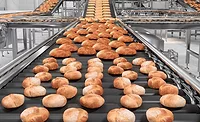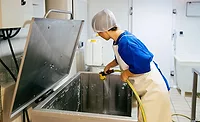How Small- and Mid-Size Food Facilities Are Coping with COVID-19

In the first days in April, I started reaching out to small food manufacturers in the state of Vermont to ask how they were coping with COVID-19. Ten manufacturers agreed to an interview, all of which have been posted to the Food Safety for Food Processors Podcasts. The facilities represented in these interviews are all small- to mid-size facilities and have between 2 and 200 employees. These facilities manufacture a variety of shelf-stable products, such as goat milk caramel, energy bars, chocolates, blend teas, maple syrup, tomato-bases sauces, further processed meat and poultry products, and even ready-to-eat products.
Here I summarize some of the responses to the coronavirus pandemic from these companies and other companies with which I have interacted over the past month. These paragraphs exemplify how they companies are reacting and adjusting to the challenges brought by COVID-19.
Impact on Supplies
Most of these companies outsource ingredients and most supplies from suppliers within the U.S. However, some of the companies that were interacting with foreign suppliers were able to identify, as easily as February 2020, the need to create contingency plans for a pandemic that would eventually reach the U.S. Some of these companies, which were following the events happening in China and some European countries, were able to prestock supplies from those countries for as long as the rest of the year. The prestocking included ingredients and packaging materials, especially those coming directly from China.
None of these companies have seen any major disruption in the supply chain. Yet, most of these food manufacturers are uncertain about what will happen over the next few months and next year. Most of them predict a slowing or disruption of the supply chain, as the measures to contain the spread of the virus intensifies in the short term.
Impact on Sales
All of these companies were affected by sales but not in the same way. The smallest companies were forced to scale down their manufacturing capacity substantially. Some increased manufacturing before reducing or stopping manufacturing altogether. Most companies that were selling to retail stores or restaurants saw an early decline in sales that have not retuned so far. The wholesale part of their business, which could be as much as 50 percent for some of these companies, is gone, and the consensus is that nobody knows when it will return and in what fashion. In some cases, a few companies found an increase in retails sales, as their products were considered staples by the public, such as tomato-based sauces for pasta.
Those with e-commerce platforms found an increase in sales and were pivoting toward an increase in the manufacturing of products sold online. Yet, none of the companies with e-commerce platforms were planning any promotions or increases in e-commerce advertising in the near future.
Employees
From the very beginning, most companies understood the importance of preventing their employees from getting sick while they were performing manufacturing activities. Some companies starting facing a reduction in the number of employees who would turn out to work. Some of the small companies had to reduce their workforce to quickly adjust to losses in sales.
The companies shifted quickly to ensuring that the employees that still came to work were following some basic physical distancing and increasing handwashing practices. Some companies increased the number of hand-sanitizer stations in the facility, primarily near the entrances, and increased training and signage for these hand-sanitizer stations. Nonessential personnel were not allowed in these facilities. Some of the interviewed manufacturers mentioned that truck and deliver drivers, who used to come into some of these facilities, were not allowed to do so any longer.
Some companies required employees to wear face masks and gloves, increase handwashing, and stay in their own dedicated working areas. Some companies added divisions, curtains, or other type of physical barriers to prevent close contact between employees. In some cases, manufacturing activities were staggered, with fewer employees per shift. Some companies incorporated the implementation of alternating shifts for the first time, or created rotation programs for their employees.
For those companies in which employee attendance was declining because employees were deciding to stay at home, the daily work was more volatile and a schedule was developed on a day-to-day basis. Every manufacturer interviewed commented that they were trying to do their best to ensure the safety of their employees. All of them had contingency plans in case any of their employees got sick. All employees were advised to monitor their own health and stay home if they were feeling sick. A few companies mentioned that some employees were self-quarantining for showing signs of sickness, but none of these employees were confirmed as being ill with COVID-19.
In cases where there were employees from the same family working in the same facility, they were retrained and reassigned in the same areas to mitigate physical distancing.
Preparedness and Other Adjustments
The companies that had obtained an SQF or BRC certification felt they were more prepared for moments of crisis because of the documents required to obtain these certifications, especially those of the crisis management program. These certifications, in addition to being more stringent about Good Manufacturing Practices and cleaning and sanitation practices, also require the organization of a crisis management program that forces companies to think about how to respond to a crisis like COVID-19.
Some of these companies have crisis management teams that have been quite active in placing the necessary controls to limit the effects of COVID-19.
In general, companies reported that production was still operating weekly, and nothing was affecting their supplies so far. Production schedules were adjusted to enforce social distancing. The “family friendly” ways of operating by some small companies were put on hold indefinitely, with companies valuing first the safety of their employees. One company that was in the middle of an expansion has since paused these activities.
In a few instances, companies were able to increase cleaning and sanitation practices by hiring a dedicated cleaning crew or re-allocating some employees to cleaning activities only.
Overall Impact
As people are still concerned about staple foods, more than specialty foods, “what will change” or “what the new norm will be” were questions with no specific answers. Some indirectly hinted at long-term, negative economic impacts for several, smaller communities that depend heavily on tourism.
A few small companies stopped manufacturing altogether, and a few started to manufacture hand sanitizers in coordination with other companies to keep personnel employed.
E-commerce has been a major source of reliance in these times, and those companies that can adapt and improve consumers’ digital experiences (sound, graphics) will have an edge in the future.
But even companies that have increased sales feel that the increase may not be long term, and that, at times, the increases in sales appear to be for “the wrong reasons.” None of these companies mentioned having any employee confirmed to be ill with COVID-19, but the impact of this disease is felt in many ways and will leave indelible changes on small- and mid-size food manufacturing companies.
Omar A. Oyarzabal, Ph.D., is an associate profesor with the University of Vermont Extension.
Looking for quick answers on food safety topics?
Try Ask FSM, our new smart AI search tool.
Ask FSM →








